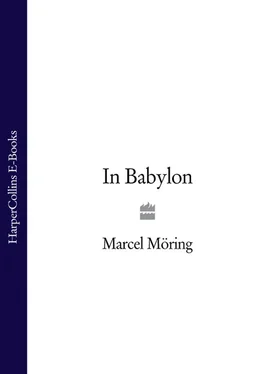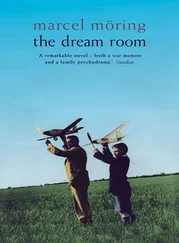1 ...8 9 10 12 13 14 ...24 The commotion in the shul carried on until late that evening, until after midnight, when an exhausted Schloime and a shattered Yankel stood outside the door of the rebbe’s study, shuffling their feet like two boys who know they’re about to be punished for stealing apples. For a long time it was quiet, until finally Yankel took half, not even half a step forward and softly whispered the rebbe’s name. It remained silent inside the room that had swallowed up Menachem Mendel ten years before. ‘Reb?’ Yankel asked again. Nothing happened. Schloime, who had bags under his eyes from weariness and care, shoved Yankel aside, pounded on the door, and cried, his voice breaking, ‘Open this door, you moth-eaten brushface, miserable sod, tapeworm …’ Yankel stared at him in amazement. From behind the closed door came the sound of slow footsteps. Yankel made ready to flee, but Schloime’s hand bit into his kapok coat. The door opened slowly and the amused face of Reb Menachem Mendel appeared.
‘What did you say, Schloime?’
‘Monkey’s arse, slimy old shoelace, piece of …’
Reb Menachem Mendel looked at Yankel and, tilting his head towards Schloime, asked, ‘What’s the matter with him?’
Yankel told him what had happened ever since Menachem Mendel had called Schloime ‘a certain name’ and what he, Yankel, had said and that they hadn’t spoken to each other since, but that their children were now courting and that since it had been Yom Kippur, he, Yankel, had wanted to make amends, but that Schloime had not, and that Aaron Minsky had said they should purge the water at its source and they thought …
‘… that this was the source,’ said Menachem Mendel.
Yankel nodded.
When Yankel Davidovitz and Schloime Kreisky came out of the shul later that morning, a group of weary men stood there waiting for them, in silence. Aaron Minsky who, since his marriage, had grown in many ways and had emerged as the village spokesman, stepped forward, raised his eyebrows, and said, ‘ Nu , Yankel and Schloime?’ But Yankel shook his head and walked straight past him, while Schloime stared at him with vacant eyes and an astonished expression and then, shaking his head, trudged off down the road.
In Kotzk the days slipped by and grew shorter and shorter, until December came and preparations were made for Chanukah, the festival that relieves the long winter gloom and points hopefully to the inevitable budding of trees and flowers, the festival that brightens the Jewish year like a light in the distance when a man has lost his way and is searching desperately for a place to shelter from the cold of a winter’s night. At Yankel Davidovitz’s house, spirits were high. The kugel was browning in the oven and the gleaming menorah stood on the table. The master of the house, surrounded by his seven daughters and wife, lit the first candle. Yankel stood before the menorah and stared into the swelling flame until it had stopped smoking, and then turned to Rivka. ‘The time has come,’ he said, ‘to speak of you and Mendel Kreisky.’ Rivka pricked up her ears. If what she thought were true, she would finally hear what all of Kotzk had been eager to know for the last two months.
‘When Schloime Kreisky and I were at the rebbe’s …’ began Yankel. His eyes strayed to the dancing candlelight. He shook his head and sat down in the chair at the head of the table. The eight women followed him respectfully.
‘We found ourselves in a room where books were piled high, on tables, on chairs, on the floor. The bookcases along the wall reached all the way to the ceiling. Books, papers, everywhere you looked. The rebbe cleared two chairs and invited us to sit down and then came and stood before us. Behind him was an oil lamp. The light seemed to wrap itself around him, like a tallith. “So, you’ve come to find the source?” Schloime nodded, a bit guiltily. His unceasing river of abuse had run dry the moment he saw the room. “Well then,” said the rebbe, “here is the source.”’
Yankel turned to Rivka.
‘There’s no stopping the love between two people, Rivka. Even if Schloime and I hadn’t been to see the rebbe, you and Mendel Kreisky would have been allowed to marry. Even a pauper with one cow and a stinking hide trader know that much.’
Rivka opened her eyes wide.
‘What the rebbe said had nothing to do with either of you, or with that senseless silence between Schloime and me, or with any of the other trifles one finds along the way. “What gives you the right,” said the rebbe, “to drag a man out of ten years of silence?” We bowed our heads. Schloime cleared his throat. “You’re still our rebbe,” he said. Menachem Mendel shook his head. “I haven’t been your rebbe for ten years. A rebbe is a teacher, not a hermit. I have nothing to do with you. I am the billygoat.” He’s lost his mind, I thought. He said, “Do you know the story of the holy billygoat?” We nodded.
Yankel looked around at the eight faces gazing back at him, glowing with excitement. ‘You know the story, too. The old man who heads for home one winter’s night and the snow is falling and the wind is blowing so hard, he can barely see the road. He walks for an hour and then stops to catch his breath. He gropes around in the bag over his shoulder and realizes he has lost his tobaccobox. He tears his hair, he beats his breast. Ayyyyy, he wails, my tobaccobox! Here I am, lost in the storm, and now my tobaccobox box is gone, too! He shakes his head and sinks down in the snow. There he sits, his head in his hands, like a weary horse that knows its end is near. Suddenly, in the distance, he hears a heavy drone, as if the very earth is shaking. The trees tremble, snow tumbles from the highest branches, the night is filled with sound. The old man looks up, and there, standing before him, is the holy billygoat. Enormous. The biggest billygoat he’s ever seen. His curved black horns reach to the stars. The man claps his hands to his eyes and starts praying. But the holy billygoat bows his head and says: Cut off as much of my horns as you need for a new tobaccobox. Trembling with awe, the old man takes his knife and cuts out a piece of the gigantic horns. He thanks the creature and runs the rest of the way home. Nobody believes him, of course, but from that moment on, each time he opens the tobaccobox, people flock around him and cry: Doesn’t that tobacco smell delicious! Where did you get it?’
Yankel stared into space. ‘Schloime and I knew the rest of the story: after a while everyone starts going to the billygoat to get a piece of horn for a tobaccobox, until finally the goat is walking the earth without any horns at all. But Menachem Mendel said: “I am that billygoat. You carve up my horns to make boxes in which the tobacco will smell as delicious as that of the first man who saw me. But has anyone ever asked themselves where that smell comes from? No one. You search, you hunt, you explore. You think: To find the billygoat, one must suffer. Or: One must be humble. Or you interpret the billygoat’s every word, every movement, and think: The world is a whole, everything is connected to everything else, or you think that seeing the billygoat is some rare privilege. Nonsense, all of it. I ask you: where does that smell come from, what is it made of?” Schloime and I shrugged our shoulders. “I’ll tell you,” said the rebbe. “That smell doesn’t come from the billygoat, it doesn’t come from its horns, it has nothing to do with the encounter between the goat and the old man. That smell is in us, we smell what we are.” Schloime shook his head. “I don’t understand,” he said, “why can’t we smell that smell, or –” and then he looked at me, “why doesn’t anyone ever smell anything but stinking hides?” The rebbe lifted a pile of books off the chair behind a large table and put them on the ground. He sat down and gazed into the light of the oil lamp. “That is because, Schloime, we only think we can smell. We walk past the house of a hide trader and what do we smell? Hog’s piss, tree-bark, rotting hides. That is also what we smell when we talk to Schloime Kreisky because he, and his father and his father’s father, have spent their lives surrounded by hog’s piss and tree-bark and rotting hides. But do we smell Schloime? Do we smell the life he leads? Do we smell his soul? No, we smell only what is around him, what he holds in his hands, what lies about in his yard. The smell of Schloime himself, which is heavenly and sweet like cinnamon, is masked by whatever else wafts our way. And we allow this, just as we allow the world to churn in our eyes, but never really see, just as we open our ears to every random scream, but never really hear.” The rebbe stared straight ahead and closed his eyes. “The secret,” he said, “is not to smell, not to hear, and not to see, and then, when all roads to the mind are closed, to open the heart and make the world anew, to see it anew, hear it anew, smell it anew.”’
Читать дальше












